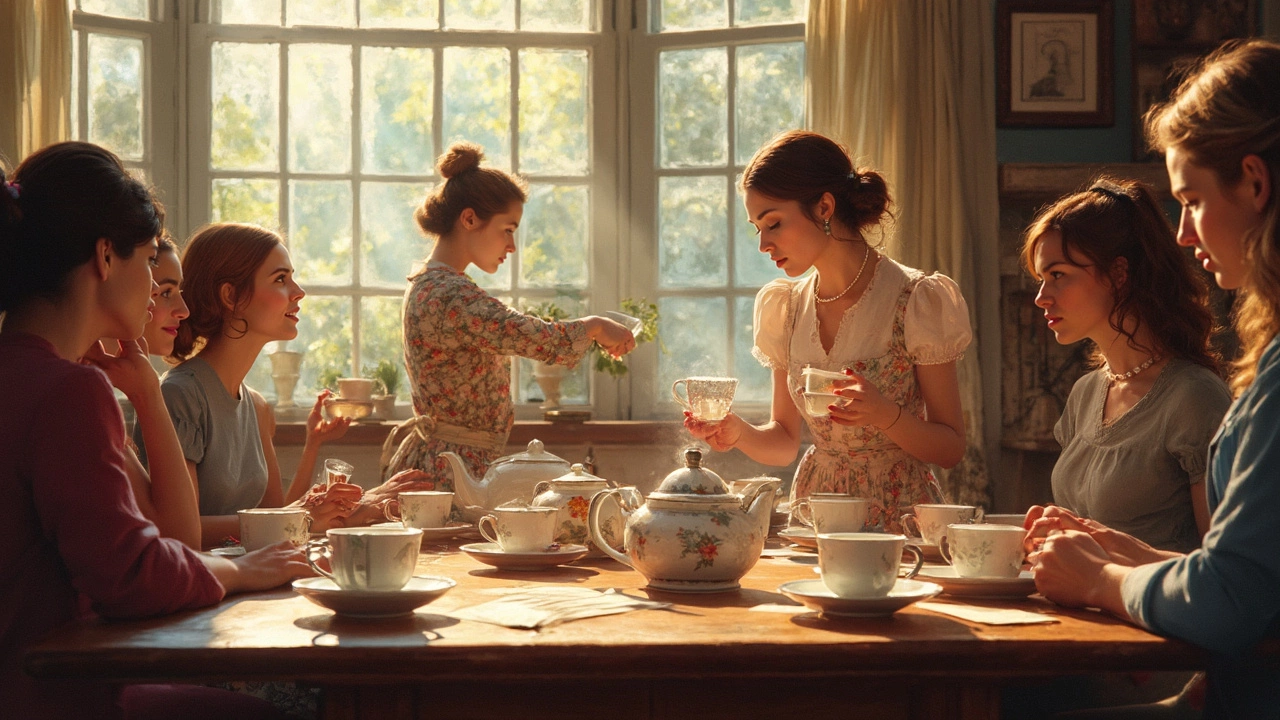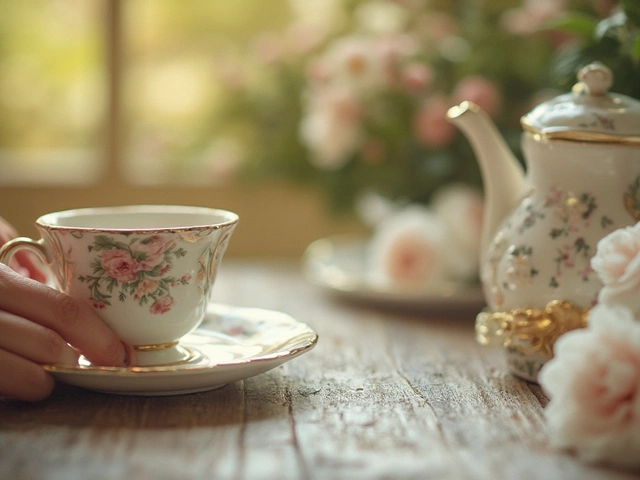Ever wonder why you hear tea pros say 'tea girl,' even when there are guys around? It doesn't mean what most people think. In the world of tea tasting, 'tea girl' is actually a bit of old-school slang. It started as a label for the person brewing and serving tea during tastings or judging panels. Doesn't matter if that person is a guy or a woman—everyone gets called the tea girl if they're in charge of prepping the tea for others to taste.
The job isn't just pouring hot water. A tea girl controls everything about how the tea gets made: the right temperature, how long the leaves steep, which pots to use. Even small changes here can mess up a tasting. People serious about tea say the 'tea girl' can make or break a session, because the person sets the stage for everyone else's palate. So next time you see that term pop up in a tasting room chat or even in a tea review, trust that it's not an insult—it’s a nod to someone skilled who anchors the whole process.
- How Tea Girl Slang Started
- What Does Tea Girl Mean Today?
- Tea Girls in Tasting Rooms: More Than Just Servers
- How 'Tea Girl' Became a Niche Compliment
- Regional Twists and How It’s Used in China
- Modern Slang and How to Talk Like a Pro
How Tea Girl Slang Started
The term "tea girl" didn’t just pop up for no reason—it’s rooted in the history of tea houses and tasting rooms, especially in China. Traditionally, these places hired young women to handle brewing and serving tea. Their job was specialized, not just about pouring drinks. They had to know the right temperature for each kind of leaf, how to time infusions so flavors came out just right, and how to run a room during busy tastings. This role was so common that the nickname stuck, even when men started doing the job later.
In the tea industry, the title wasn’t a sign of lower rank but more a trusted position. Tea traders and buyers would rely on the 'tea girl' to set a level playing field for comparing batches. Some historic tea auctions in places like Guangzhou still talk about the legendary skills of local tea girls from the early 20th century. The term traveled beyond China too—when specialty tea made its way to the West, professionals there borrowed the lingo, often with a wink and a nod since anyone could get the 'tea girl' label, gender aside.
Here’s a snapshot of where you’d find tea girls historically:
- Classic Chinese tea houses (pre-1950s)
- Tea factories during grading exams
- Large-leaf tea processing sites in Yunnan
- International tea fairs and competitions
To put it in perspective, check out this table showing when and where the "tea girl" role became recognized:
| Time Period | Region | Tea Girl Role |
|---|---|---|
| Late 1800s | Guangdong, China | Brewed teas during trading sessions |
| 1920s-1940s | Yunnan, China | Handled tastings for raw pu-erh buyers |
| 1950s-1980s | Eastern China | Assisted judges at tea competitions |
| 1990s-present | Worldwide | Tasting room expert, regardless of gender |
This whole story explains why tea girl slang is still around and why it doesn’t always mean what someone outside the tea scene would expect.
What Does Tea Girl Mean Today?
These days, the slang "tea girl" isn’t about gender. In professional tea tasting, it’s more of a job title. The tea girl slang just refers to whoever’s running the show on the tea table—man or woman. This person makes sure everyone gets the same tea to taste, brewed in exactly the same way. No special treatment, no weird tweaks; just clean, consistent brewing across all cups.
This role matters way more than outsiders think. During big tea competitions in China, the tea girl handles timing, temperature checks, and even the order of serving. In fact, some Chinese tea schools teach students the "tea girl sequence" because judges expect things done by the book. One badly-brewed round can throw off a whole competition, which is probably a nightmare scenario for pros.
Day-to-day, even upscale tea shops and tasting rooms use the term. It's not uncommon to hear, "Who’s tea girl today?" even if the guy with the thermos has a beard and three rings. It’s tongue-in-cheek, kind of like calling the audio tech at a gig "the sound guy," even if it’s a woman. It’s just tradition, and everyone who spends enough time in tasting circles gets it.
Here’s a snapshot of what a tea girl handles at a standard tasting:
- Weighs tea leaves for each session
- Controls water temperature to the exact degree (90°C for most greens, higher for some blacks and oolongs)
- Sets the timer for steeping times—usually 30 seconds to 3 minutes depending on style
- Rinses tasting cups between rounds, no flavor cross-over allowed
- Records brew details for judges or tasters
Want actual numbers? Take a look at what goes into a formal tea competition brew:
| Tea Type | Water Temp | Leaf Weight | Steep Time |
|---|---|---|---|
| Green | 80-85°C | 3g/150ml | 1-2 min |
| Oolong | 90-95°C | 5g/150ml | 1-2 min |
| Black | 95-98°C | 3g/150ml | 2-3 min |
So if you get asked to be the tea girl at the next tasting, don’t sweat it. It’s not about gender and it’s far from an insult. Honestly, it means you’re handling the most trusted spot at the table.
Tea Girls in Tasting Rooms: More Than Just Servers
The term tea girl slang might sound simple, but in real tea tasting rooms, these folks are way more than people pouring hot water. Picture this: at a big tea competition in China, or even at smaller events in tea shops, a "tea girl" is usually the person everyone depends on to brew, time, and prepare each round of tea for a panel of judges or customers. Most people think it's just about serving, but it takes real skill to do this job right.
Here’s what tea girls actually handle in a busy tasting room:
- Choosing the right water temperature for different teas (for example, green tea likes it cooler than black tea).
- Making sure steep times are exact—every second matters if you want true flavor.
- Switching teapots between rounds to avoid cross-flavors.
- Cleaning all equipment fast, so tastings stay on schedule.
- Making notes about each batch to spot any changes or mistakes.
Getting this stuff right isn’t just for show. In Chinese national grading tests, tea girls (again, could be guys) can boost or ruin a producer’s whole reputation by how they handle brewing. Judges lean heavily on these folks to guarantee every tea gets a fair shot.
Check out this quick table showing what a tea girl usually does during a formal tasting session:
| Task | Why It Matters |
|---|---|
| Measure leaves | Consistency across samples |
| Control water temp | Prevents burning or dull flavor |
| Time steeping | Ensures fair comparison |
| Record session notes | Keeps track of variables for clarity |
If you think it’s just about pouring tea, think again. When pros say someone is great as a tea girl, it’s their way of showing respect for someone with sharp focus, steady hands, and, honestly, strong nerves. Good tea girls get noticed—at some famous tasting championships, judges have requested specific tea girls for their sessions to make sure the tasting is top notch.

How 'Tea Girl' Became a Niche Compliment
Here's the twist: calling someone a tea girl slang in a tasting room is less about gender and more about skill. Back in the early 2000s, the slang picked up among Chinese tea judges and dealers. It was almost a secret handshake—if you used the term, people knew you had real tasting room experience, not just casual sipping at home. What most folks don’t get is that tea prep isn’t basic—it’s crazy detailed. The right "tea girl" has to know how each tea should be brewed to show its best side, especially if the leaves are rare or expensive. It’s kinda like working the soundboard at a live concert. Mess it up, and even the best band (or tea) falls flat.
Now, in some parts of China, being the "tea girl" means you’re trusted, not just with pouring but with making judgment calls about brew times, water, even the order of teas for a panel. Some Hong Kong tea shops have even started to feature their best "tea girl" on social media—turns out, customers want to know the face behind their perfect cup. At major tea competitions like the Guizhou Green Tea Challenge, the person prepping the tea is sometimes introduced by name, and judges often chat about who the best "tea girl" was that season.
| Year | Event | Role of "Tea Girl" |
|---|---|---|
| 2004 | Mainland China Tea Expo | Prepped and served 45 teas for panel |
| 2012 | Shanghai Tasting Challenge | Judged on brewing precision and etiquette |
| 2021 | Hong Kong Private Tastings | Featured on shop websites as expert conductor |
Bottom line: if a tea head calls you the "tea girl" in a tasting setting, they’re basically calling you the MVP. It means you’ve got the touch, and everyone around the table is quietly grateful for your steady hand. It’s one of those compliments that means more the deeper you get into tea culture.
Regional Twists and How It’s Used in China
You’ll hear 'tea girl' used a little differently depending on where you are. In China, the tradition behind the word stretches way back, mostly around specialty tea shops and high-level tea events. Here, 'tea girl' (or 'chá nǚ' in Mandarin) doesn’t only mean someone brewing tea for others. It’s often a term for the person handling the whole tea ceremony—from warming cups to measuring leaves and managing each infusion. A lot of skilled tea workers, both women and men, get called this without anyone blinking.
In Yunnan, the home of pu-erh, you might see young women in local dress at famous markets being called tea girls as they demo teas for tourists and buyers. But if you drop in on a serious cupping session in Fujian, whoever is behind the tray—man or woman—gets called tea girl, and it’s a badge of skill, not a job title. Most tea producers and professionals say the only thing that matters is your brewing precision and knowledge.
Some modern tea bars and tasting houses in big cities like Shanghai have tried to rebrand the role as 'tea master' or 'tea artist,' but among tea insiders, 'tea girl' sticks. It sounds humble, but carries real respect in the tasting scene. So if you're hanging out in a Chinese tasting room and someone points out the 'tea girl,' they're talking about the most trusted person at the table—not just someone filling water kettles.
Here's a quick tip if you’re traveling or trying to fit in with pro tasters: use the slang with that local context in mind. If you’re visiting historic tea regions, don’t get stuck on who’s wearing what or how old they are. The tea girl slang is all about who runs the session smoothly—no ego, just skill and tradition.
Modern Slang and How to Talk Like a Pro
If you walk into a tea tasting and want to sound like you know what you’re talking about, learning a few key terms is a smart move. The scene has way more to it than just sniffing leaves and nodding. Knowing some modern slang helps you fit in and keeps you from getting lost when pros start tossing around phrases.
Today, the term tea girl slang is still alive, but there’s a whole list of other words flying around. For example, you'll hear “gaiwan master” for someone skilled with that iconic lidded brewing vessel, or “puerh head” for a die-hard fermented tea fan. A “liquid gold” shout usually means someone just brewed a rare, pricey tea—and it totally lived up to the hype.
Simon Ng, a Hong Kong-based tea educator, summed it up this way:
“Slang makes the tea world friendlier. When someone calls you ‘tea girl,’ in most tasting rooms, they’re really saying you’re steering the whole ship—so don’t take it the wrong way.”
Here’s a list of phrases pros throw around, so you know what’s up:
- Tea drunk: That buzzy, relaxed feeling after sipping lots of high-quality tea.
- Session: One round of brewing and tasting, usually with friends.
- Teahead: Someone obsessed with all things tea.
- Gongfu brewing: A Chinese method focusing on small pots, lots of leaves, and multiple short infusions to get max flavor.
- Cha qi: The supposed “energy” or “life force” found in great teas, especially pu-erh.
If you’re stepping into a tasting, try using some of these terms, but don’t overdo it. People can spot a poser right away. Best tip? Be curious, listen more than you talk, and don’t be afraid to ask what something means. That’s the fastest way to actually sound like a pro—because even experts learn something new at every session.


